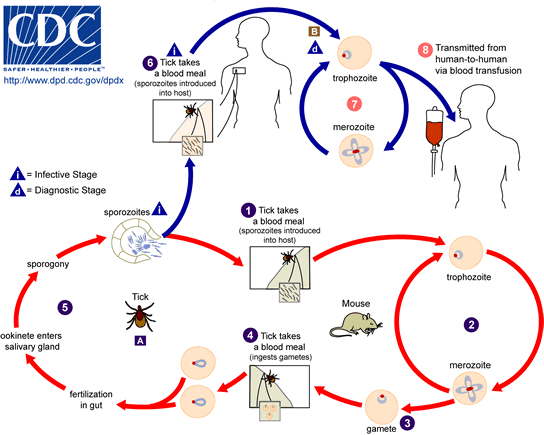The Tick-borne parasite disease Babesiosis makes a comeback

Lyme disease isn’t the only worry for outdoor lovers this summer. Deer ticks (Ixodes scapularis) also carry a lesser known parasite that gives rise to a potentially fatal illness called babesiosis.
Babesiosis is caused by microscopic parasites that infect red blood cells and are spread by certain ticks. In the United States, tickborne transmission is most common in particular regions and seasons: it mainly occurs in parts of the Northeast and upper Midwest and usually peaks during the warm months. (CDC)
Although many people who are infected with Babesia do not have symptoms, for those who do effective treatment is available. Babesiosis is preventable, if simple steps are taken to reduce exposure to ticks.

The protozoan Babesia microti, commonly harbored in certain ticks and mice species, has made a comeback in recent years. Despite its discovery in the late 1960s, babesiosis cases have increased in the Lower Hudson Valley area of New York state, according to a recent study in the CDC journal Emerging Infectious Diseases.
Examining seven counties’ hospital cases from 2001 to 2008, the team found the annual number of infections rose from six to 119 during the decade. Most patients studied were exposed through deer ticks bites, while two were exposed via blood transfusions. Researchers suspect the illness can occur alongside Lyme disease as well, making it difficult for doctors to give an accurate diagnosis.
It’s unclear why doctors are seeing more cases of the disease, but one expert says the infections are under-reported and moving westward, according to one USA Today article.

Babesiosis can be troublesome for people venturing into tick-infested areas in the summer months. Though the parasite isn’t as widespread as the bacteria responsible for Lyme disease, the two microbes overlap in areas in the Northeast and upper Midwest.
But the danger of babesiosis is the fact that is can thrive undetected. Blood smear tests can detect the parasite, but they aren’t always effective. Even more, some people fail to show any signs of babesiosis infection. Others will experience flu-like symptoms, including head, body and muscle aches, fevers, chills and fatigue, according to the CDC.
Once introduced to the blood stream, usually through the infected saliva in tick bites, Babesia parasites invade and feed on the body’s red blood cells. The protozoans also multiply within the cell and shed new parasites into the bloodstream, where they’re free to infect other cells.
If left untreated, babesiosis infections can result in organ failure and can be fatal for older individuals or people with compromised immune systems. For most people, however, treatment is effective, especially early on.
Avoiding tick bites is a large step toward reducing the risk of being exposed to tick-borne illnesses. If you’re living or visiting areas where deer ticks are more common, experts say it’s a good idea to stay on trails, avoid areas overgrown by grass and bushes, wear pants and use insecticides such as DEET to repel ticks. Once you get back indoors, checking for ticks on your skin, hair and clothing help, too. (DiscoveryNews)

Commenting rules and guidelines
We value the thoughts and opinions of our readers and welcome healthy discussions on our website. In order to maintain a respectful and positive community, we ask that all commenters follow these rules:
We reserve the right to remove any comments that violate these rules. By commenting on our website, you agree to abide by these guidelines. Thank you for helping to create a positive and welcoming environment for all.